- Home
- Jeff Mariotte
City Under the Sand
City Under the Sand Read online
“Halflings!” went the shouts of the soldiers. “It’s halflings!”
Faces painted with what must have been the dried blood of the caravan’s dead, the halflings charged out of the desert screeching incomprehensible words from voracious mouths. They carried every kind of weapon imaginable; ivory swords and obsidian-tipped spears, gouges and gythkas—some wielded the horns of of exotic animals, filed to dagger-sharp points. Most were naked, or nearly so, though a few wore pieces of chitin armor no doubt stolen from previous victims of their raids. Halflings, Aric had heard, bore no trace of humanity. They were savages with only bloodthirstiness and cruelty in their feral little hearts.
It seemed there were hundreds of them. They swarmed into the Nibenese soldiers, cutting and stabbing as they came. Damaric stepped to meet the onrush. His rod spun so fast it seemed to be a solid shield, the wider ends batting away halfling weapons and crushing skulls at the same time. Amoni gripped the handle of her cahulaks and swirled them about, four-bladed heads at the rope’s ends slicing through flesh and sending halfling blood spraying into the air. Ruhm seemed pleased to have an enemy he could see, and he waded into their midst, his club flying this way and that in a killing flurry.
DUNGEONS & DRAGONS
CITY UNDER THE SAN
©2010 Wizards of the Coast LLC
All characters in this book are fictitious. Any resemblance to actual persons, living or dead, is purely coincidental.
This book is protected under the copyright laws of the United States of America. Any reproduction or unauthorized use of the material or artwork contained herein is prohibited without the express written permission of Wizards of the Coast LLC.
Published by Wizards of the Coast LLC
DUNGEONS & DRAGONS, DARK SUN, WIZARDS OF THE COAST, and their respective logos, EBERRON and FORGOTTEN REALMS are trademarks of Wizards of the Coast LLC in the U.S.A. and other countries. Other trademarks are property of their respective owners.
Cover art by Justin Sweet
Map by Robert Lazzeretti
eISBN: 978-0-7869-5806-1
U.S., CANADA, EUROPEAN HEADQUARTERS
ASIA, PACIFIC, & LATIN AMERICA Hasbro UK Ltd
Wizards of the Coast LLC Caswell Way
P.O. Box 707 Newport, Gwent NP9 0YH
Renton, WA 98057-0707 GREAT BRITAIN
+1-800-324-6496 Save this address for your records.
Visit our web site at www.wizards.com
v3.1
To Maryelizabeth, with love.
Great appreciation is due many people for their support, friendship, and assistance during this project. Some of those people—but by no means all—are Fleetwood, Howard and Katie, friends in the gaming community including Matt, Jess, Amy & Boyan, Weston Ochse, Dianne Larson, and the terrific crew at WOTC.
EMERGENCE
1
Silt storm!”
At Avra’s bellow, chaos ceased. For a long moment, the clatter and clack of weapons halted, as did the grunts and cries of the combatants, and even the rasp of sandaled feet scrabbling in sand.
All turned toward the southeast, toward the northern end of the Sea of Silt, which reached far into this almost forgotten country. The Road of Kings skirted the sea’s shores as it wound toward Raam and Draj, south of their present location, but a running battle with raiders had driven the merchant party off course, well north of the road.
On a day like this, with a fierce wind raging out of the south, the lightweight silt could be carried for great distances. The two forts between here and the sea had no doubt been blasted, their inhabitants still picking it from teeth and eyes, dusting it off everything they possessed.
Avra realized the storm was worse than he had first thought. The massive cloud barreling toward them was a mixture of gray and yellow. Silt and sand together. Silt was lighter, a nuisance, but the sand would sting and scour more. The cloud towered high above the plain; behind it the burning sun of Athas was a flat, distant pink disc hovering just above the horizon. It looked almost harmless.
Even as the realization of the cloud’s potential pierced Avra’s brain, the sounds of battle resumed as combatants tried to take advantage of the momentary distraction. Paid mercenaries fought side by side with House Faylon’s slaves to defend the House’s caravan against marauding raiders: a mixed group of humans, elves, half-elves, goliaths and others. Should the raiders prevail, every member of the caravan would be slain. If the guards won, the caravan would return to the main trading route and continue on to Draj, to sell goods mainly from hard, durable agafari wood and to buy grains and hemp for sale back in Nibenay.
Avra had spotted the storm behind his foe, a raider with the lean, hardened look of a former Raamite soldier. The man had risked a quick glance over his own shoulder, but, curiosity satisfied, stabbed at Avra with a dragon paw. Avra brought his agafari-wood sword up in time to block the thrust, sending the bone blade jabbing harmlessly past his right leg, but the raider spun the dragon paw around and came at him with the blade at the short staff’s other end. Yet another blade thrust out from a guard protecting the Raamite’s hand at the shaft’s midpoint; Avra had already suffered a cut from that one.
Before the Raamite could bring his weapon into position, Avra kicked the dragon paw’s shaft with his right foot, knocking the blade wide. As Avra dropped his foot, his balance shifting forward, he thrust his sword into the other man’s exposed midsection. The Raamite wore a chitin breastplate, but it only came to mid-abdomen. Avra’s blade nicked it but stabbed deep. The Raamite let out a gasp, his dragon paw dropping to the sand. Blood bubbled from the raider’s mouth and gushed from the wound as Avra withdrew his blade, and then the man pitched forward.
Avra dodged the falling body, shook droplets of blood from his sword, and scanned for his next opponent. Two raiders teamed up against his friend Curran, a dozen long paces away. Avra ran toward them.
And the cloud hit.
In an instant, Avra was blind and deaf.
The world vanished, obscured by the impenetrable, choking haze of sand and silt. It burned, tearing at his exposed flesh like flames intent on peeling the skin from his bones. He closed his eyes and mouth, but the wind pulled his lips apart enough to let the mixture coat his teeth. His eyes were rimed with the stuff, and he stumbled forward, not daring to open them lest he be permanently blinded. Even before his ears filled, he could hear nothing but the howl of the wind, the flutter and flap of his loose desert garb, and the grainy stammer of particles striking him.
Surrounded by enemies, he dared not relax his guard. But if he couldn’t fight, neither could they. Or so he hoped.
In a smaller sandstorm or dust storm he might simply have crouched down, covered up, and waited it out. But this one showed no sign of ending soon, and he didn’t dare crouch because such a tempest could shift an entire dune, or form a new one, in no time, and of the things Avra feared most in life, confinement was near the top of the list.
So he flailed with his wooden sword and stumbled on, desperate to remain upright in the punishing wind and biting sand.
And the storm raged on.
2
Avra only knew when night fell because of the cold, although the heavy coating of sand around him offered shelter. Finally, the following day, it ended. A last gust of wind, a final pelting of sand—redundant, at this point, he was so coated in it he might have been a sculpture from a Nibenese building, come to life—and then all was still. At once, Avra felt the full heat of the sun beat down upon him. Should have enjoyed the shade while I could, he thought with a bitter, sand-filled grin. In the Athasian deserts, only water was scarcer.
He dusted his fingertips against each other and wiped grit from his eyes, using his thumbs to get into the corners.
He spat and spat even as it pained him to lose water so senselessly. He rubbed his teeth, dug specks from the insides of his cheeks, and spat some more. He turned his head perpendicular to the ground and smacked the other side, trying to dislodge sand from his ears. His scalp might never be free of it.
Only then did he think of the raiders, and the caravan he had been hired to protect. He blinked, shielded his eyes with one gritty palm, and turned in a slow circle.
He didn’t know where he was. Or where anyone else was, for that matter. Caravan and raiders alike had vanished. More likely, he had—bumbling blindly through the storm for an afternoon and a night and much of the next day, in a desert where a person could lose his bearings ten minutes from camp.
He wasn’t even sure which way he had traveled. He might be back to the Road of Kings, or beyond it, or farther north than he had ever been in his life. Before him were dunes, a few scrubby plants, and the baking Athasian sun.
At least I’m not buried alive, he thought. He laughed out loud at the very idea, so concrete a few minutes ago, but seemingly absurd in the present stillness.
Or was it? What if he had gone nowhere, but his comrades and enemies were even now buried underneath new layers of sand and silt? The idea raised hackles at the back of his neck, and a line of sweat trickled down between his shoulder blades. “Hello!” Avra called, then again, louder and more anxiously, “Hello, anyone!”
No answer came back to him, not even an echo. It was as if the desert sand sucked his voice from the air before it traveled ten paces. He cupped his hands to his mouth and shouted once more.
This time, he heard an answering cry.
“I’m here!” a familiar voice shouted. “Avra, is that you?”
“Hagkun?” Avra called. Hagkun was a mul, the offspring of a dwarf mother and human father, he knew from Nibenay’s gladiatorial pit. They had both hired on as mercenaries at the same time, after House Faylon had lost a good number of their combat-trained slaves in a previous raid. In Nibenay, freemen could compete in the pits, and Avra had never been good for much besides fighting, so he carved himself a fair career as a gladiator until this opportunity presented itself.
“Aye, it’s me! Where are you?”
There wasn’t a familiar landmark within sight, other than the sun. “I’m standing beneath the Reservoir Gate with a dozen naked templars!” Avra called. “What do you want me to say? I am where I am, and I imagine you’re the same!”
A moment later he spied Hagkun cresting a low dune, dusting his shoulders with both hands. Clouds of silt rained down. Like all products of the unusual union of humans and dwarves, Hagkun was hairless, and his skin had a rich coppery sheen to it. Sun at his back, the mul cast a long shadow against the near face of the dune. “I’m right here,” he said. “As are you.”
“But where’s everyone else?” Avra asked. “The caravan … where’d they all go?”
Hagkun shifted his massive shoulders. “Who can say?”
Another voice boomed across the sands from behind them. “Survived, did you? Luck, then, or you’ve paid someone off.”
Avra spun around, his agafari-wood sword still clutched in his fist after all this time. But it was only Burek, and behind him Curran, both looking as if they had just dug out from sandy graves.
“I credit luck,” Avra said. “Certainly no cleverness on my part was involved.”
Shen’ti and Maron joined them next, but that was all they could find. There were no weapons or other gear scattered around, convincing them that they had left the caravan behind, and not that the ferocious wind had carried everyone else away.
All were warriors, either mercenaries or slaves, trained in the pits and entrusted with the security of the House Faylon caravan. Even without the six of them, more than a dozen other guards remained with the merchants—supposing the others hadn’t died, or become lost themselves. If the raiders had also survived the storm, Avra didn’t hold out much hope for his employers.
“Where are we?” Burek asked. He was a short man, with a long, thick black beard tied in three knots and a head as round and hairless as an erdlu egg.
Blank faces all around. Finally, Curran pointed at the sun. “Sun’s there,” he said. He jerked a thumb over his shoulder. “So Nibenay is there.” He pointed in yet another direction. “Raam should be about there.”
“And the caravan?”
“No idea.” Curran turned his hawklike face to the south. “There, maybe? Or that direction, anyway. If we went north during the storm.”
“I’m sure I didn’t move in a straight line,” Hagkun said. “I went wherever the wind shoved me.”
“As did I,” Avra admitted.
“Then we have only the vaguest of ideas,” Curran said.
“Exactly,” Avra said. “But we can’t stay here. We’ll need water soon, and shelter for the night. Even under a blanket of sand last night, I nearly froze.”
“Toward Nibenay, I say,” Maron offered. “We’ve a better chance finding a target that size than any of those others.”
Shen’ti pointed toward the rocky hills—covered with sand now, but still recognizable for what they were. “I say we climb those and have a look. We may be able to see the caravan from that height, or some other landmark from which we can set a course.”
After a few minutes of discussion, the others agreed. They took stock of their belongings. Two of them had lost their weapons, except for small daggers. Only Shen’ti carried water, in a bladder slung over his back. Five were wounded, none seriously. They were strong men, fighters. Survivors. They would be fine.
They drank from Shen’ti’s store and then hiked toward the Athasian sun.
At the crest of the hill, the others scanned the horizon for signs of the caravan. But Avra stared past a huge, tall dune where a city shimmered in the near distance.
A city where, by all rights, none should exist.
3
Sand was unevenly mounded to one side of the city, like a blanket shoved over to reveal some of what it had covered. Short towers and spires jutted up from the ground, but most of the city was low buildings, spreading back into the desert. “Ral’s light,” Burek muttered. “What is that?”
“It’s a city,” Avra said.
“I can see it’s a city! But what city lies there?”
“That’s on no map. It’s something ancient,” Hagkun offered. “Covered by dunes all these years. Probably exposed by the storm.”
“You’re right,” Shen’ti said. “Let’s take a closer look. Perhaps we can find shelter for the night, even water.”
“If there’s water in there,” Burek said, “it’ll be so old and filthy I wouldn’t touch it, no matter how thirsty I was.”
“I’m with Burek,” Maron said. “But I wouldn’t mind taking a look, just the same. I wouldn’t drink its water, but I’d help myself to its gold.”
“You think there’s gold in there?” Shen’ti asked.
“We won’t find out standing here.”
Burek grabbed Avra’s upper arm. “I don’t know about this …”
Burek had always been a cautious sort, for a warrior. “It’ll be fine,” Avra said. “There are six of us, and we’re armed. Even if there are beasts hiding in those ruins, we’ll be safe.”
Burek released him and glanced into the olive sky, deepening as the sun lowered toward the horizon. “On Athas, who is ever truly safe?”
Avra saw his point, and he kept his sword in his hand as they scrambled down the hill and trudged across a stretch of open desert toward the city. In the late afternoon sun, it was dull, rather than gleaming, as Nibenay would have. It was as if all the color and shine had been worn off by the ages and by its burial.
As they grew nearer, the first thing Avra noticed was that nothing grew on the dirt-choked city streets. The city had been buried so long that every plant had died, even the wiry tufts of grass and the spindly ocotillo wands that seemed capable of surviving in the most sun-blasted wastelands. The lack of pla
nts gave the scene a strangely artificial feel, as if the city had never been intended for habitation.
But signs of habitation made themselves clear, soon enough.
The men were quiet as they passed what would have been an exterior wall, crumbled under the desert’s weight, and started across a wide avenue just inside that first wall. Buildings rose before them, two or three stories tall. The air was still, carrying no particular fragrance save the dry smell of bare earth.
He had never seen a city so utterly silent. Streets intersected this wide avenue and ran into the city’s depths, but nothing moved on them.
“I don’t like it,” Burek said. “What if it’s haunted? Or cursed?”
“And what if there are vaults full of gold and precious jewels just down one of these streets?” Maron countered. “We won’t know until we look.”
“If we leave now we might yet find an oasis before nightfall,” Burek said. “My throat is parched.”
“I’m saving the rest of the water for when we really need it,” Shen’ti said.
“That’s what I mean. We need to find another source, before we’re all fighting over what little you have.”
“One hour,” Hagkun suggested. “I say we take one hour, we explore. Then we look for an oasis.”
“What say you, Burek?” Avra asked. “Fair enough?”
Burek rubbed his hairless crown with his palm, still coated in grit from the storm. “I still don’t like it,” he said. “But I’ll go along with it.”
“Good,” Maron said. “Now, should we split up so we can cover more ground?”
“No!” Avra and Shen’ti said, almost as one.
“We stay together,” Avra added. “It looks quiet, but we don’t know what might dwell within these old buildings.”

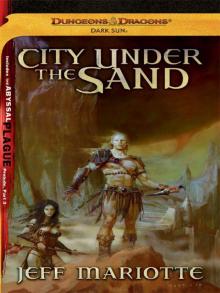 City Under the Sand
City Under the Sand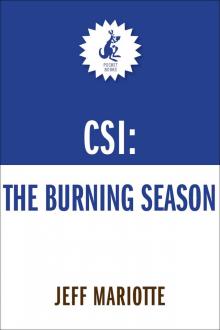 The Burning Season
The Burning Season Sanctuary
Sanctuary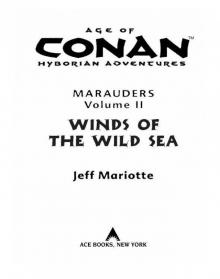 Winds of the Wild Sea
Winds of the Wild Sea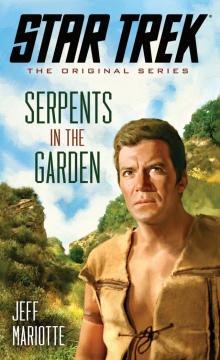 Serpents in the Garden
Serpents in the Garden Close to the Ground
Close to the Ground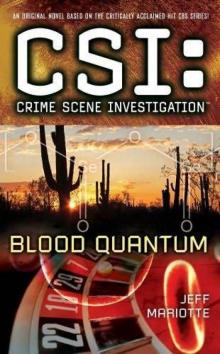 Blood Quantum
Blood Quantum Brass in Pocket
Brass in Pocket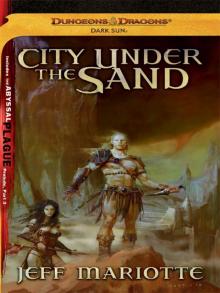 City Under the Sand: A Dark Sun Novel (Dungeons & Dragons: Dark Sun)
City Under the Sand: A Dark Sun Novel (Dungeons & Dragons: Dark Sun)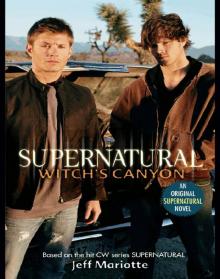 Witch's Canyon
Witch's Canyon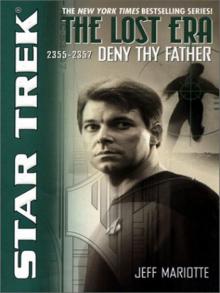 STAR TREK: The Lost Era - 2355-2357 - Deny Thy Father
STAR TREK: The Lost Era - 2355-2357 - Deny Thy Father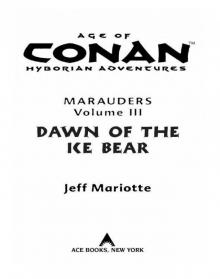 Dawn of the Ice Bear
Dawn of the Ice Bear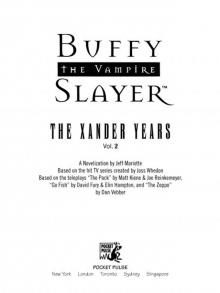 The Xander Years, Vol.2
The Xander Years, Vol.2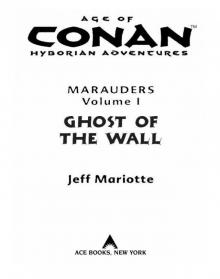 Ghost of the Wall
Ghost of the Wall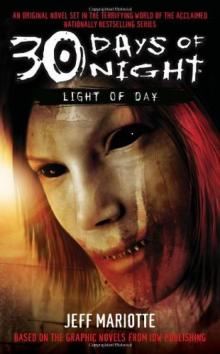 30 Days of Night: Light of Day
30 Days of Night: Light of Day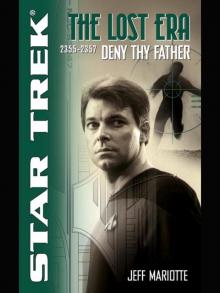 Deny Thy Father
Deny Thy Father Criminal Minds
Criminal Minds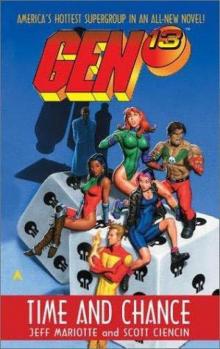 Time and Chance
Time and Chance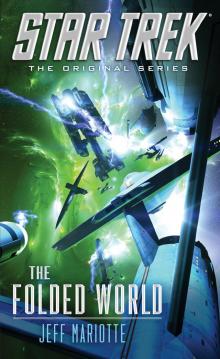 The Folded World
The Folded World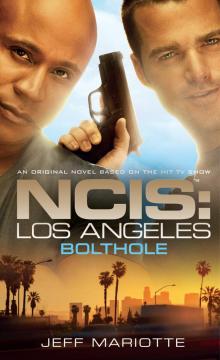 Bolthole
Bolthole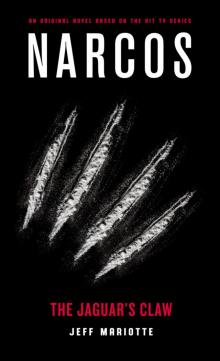 Narcos
Narcos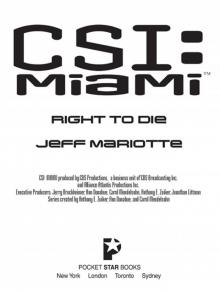 Right to Die
Right to Die